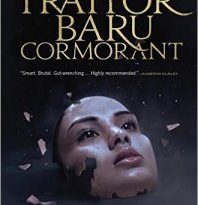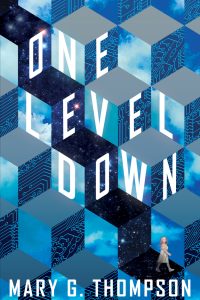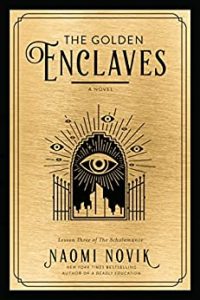Liz Bourke Reviews Daughter of Winter and Twilight by Helen Corcoran
 Daughter of Winter and Twilight, Helen Corcoran (O’Brien Press 978-1-788493703, €14.99/£13.99, 566pp, tp) September 2023. Cover by Emma Byrne.
Daughter of Winter and Twilight, Helen Corcoran (O’Brien Press 978-1-788493703, €14.99/£13.99, 566pp, tp) September 2023. Cover by Emma Byrne.
Helen Corcoran’s Daughter of Winter and Twilight is both like and unlike her debut novel, Queen of Coin and Whispers. Like, in that it is a compelling coming-of-age narrative with strongly drawn characters and a vivid world. Unlike, in that where Queen of Coin and Whispers focused heavily on political intrigue and romance, told from the point of view of two different women, Daughter of Winter and Twilight is a kind of katabasis: a mythic reckoning both with ancient gods and with the more mundane scars of the protagonist’s early childhood.
Emri is the adopted daughter of the queens of Edar, and heir to their throne. While her adopted parents love her dearly, Emri’s painfully aware that the consequences of her birth father’s brief usurpation of the Edaran throne haunt her family, and make her own political future more difficult than it might otherwise be. About to come of age, she’s struggling to reconcile a rift in her relationship with one of her best friends – Emri thought she and Rialla were in love, but Rialla is not prepared to marry a queen-in-waiting – and despairing that she’ll ever live up to her mothers’ achievements. Her mood is not improved by the state visit of her close-in-age cousin Melisande, who she has not seen since the years of their childhood that they spent in the care of their abusive grandmother. Melisande is heir to a neighbouring kingdom: attractive, witty, and seemingly effortlessly charming. And she knows some family secrets that have the power to change how Emri views at least one of her mothers.
But before Emri has the chance to do anything with this information, she’s quite literally spirited away. Along with Melisande, and two other young royals of around their age (Theo, a prince whose betrothal to Emri has long been under discussion, and Gabriela, whose stern and arrogant grandmother might be a good queen but is not kind to her family), they’re deposited in the cold halls of an icy mountain temple, there to face ancient powers. The gods, long dormant, want to return. Lady Winter offers Emri a challenge, and no choice at all: escape her trap with all of her companions, restore the power of magic to the world, and her mind will remain her own. Fail, and not only will her companions die, but Lady Winter will claim her for her own, no more than a puppet for the coldest goddess’s will.
And the magic will return anyway, albeit more slowly.
Is there a way out of a cold, furious goddess’s trap? Stuck in an underground labyrinth with three strangers, all of them young and proud, all of them with their own secrets, the physical and emotional challenges may overcome them all. Part of the goddess’s trap brings all of them face to face with some of their least appealing and least flattering memories, and Emri is confronted with some of the worst possibilities of her past, and her self. Terrible things will happen if she can’t escape. Terrible things may happen anyway. Growing up and reckoning with your history and heritage isn’t easy even when you aren’t trying to escape a trap.
Told from Emri’s point of view, this is a novel about families and power, secrets and dealing with the consequences of the previous generation’s choices. The choices of families and the choices of kingdoms are mirrored and contrasted in the choices of goddesses (and other divinities). Corcoran gives us time to see Emri reckoning with her roles as daughter, cousin, friend, young adult growing into adulthood, and how she struggles to understand and balance her relationships and her self-understanding in light of her role as a princess and heir, simultaneously the daughter of respected and accomplished queens and a reviled failed usurper, before bringing in a more epic frame. The tension in the more mundane first part of the novel is personal, domestic – despite its setting in a royal court – driven by Emri’s doubts and fears and her unsettled friendships. In the second half, the narrative tension is given additional impetus by the goddess’s challenge, and the obstacles Emri and her companions face, but the driving force of that tension remains the conflict between Emri’s doubts and fears and what she needs to do, what she needs to believe, and the person she needs to become.
Corcoran’s gods are believably terrifying, a compelling combination of human and not human at all. The four young royals are very relatable young adults stuck on the worst ever camping trip, strongly drawn individuals with their own struggles and agendas. And while the pace sometimes lags, Queen of Winter and Twilight is a vivid, entertaining fantasy coming-of-age. I really enjoyed it. More, please?
Liz Bourke is a cranky queer person who reads books. She holds a Ph.D in Classics from Trinity College, Dublin. Her first book, Sleeping With Monsters, a collection of reviews and criticism, is out now from Aqueduct Press. Find her at her blog, her Patreon, or Twitter. She supports the work of the Irish Refugee Council and the Abortion Rights Campaign.
This review and more like it in the October 2023 issue of Locus.
 While you are here, please take a moment to support Locus with a one-time or recurring donation. We rely on reader donations to keep the magazine and site going, and would like to keep the site paywall free, but WE NEED YOUR FINANCIAL SUPPORT to continue quality coverage of the science fiction and fantasy field.
While you are here, please take a moment to support Locus with a one-time or recurring donation. We rely on reader donations to keep the magazine and site going, and would like to keep the site paywall free, but WE NEED YOUR FINANCIAL SUPPORT to continue quality coverage of the science fiction and fantasy field.
©Locus Magazine. Copyrighted material may not be republished without permission of LSFF.







